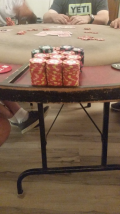grebe
Full House
In games like this, I would go away from standard raise sizing to find the size that makes people start to fold. I would use that size for all my raises.Playing bloated, multi-way pots OOP in situations where there is no FE pre and your opponents range is ATC is a recipe for disaster IMHO

